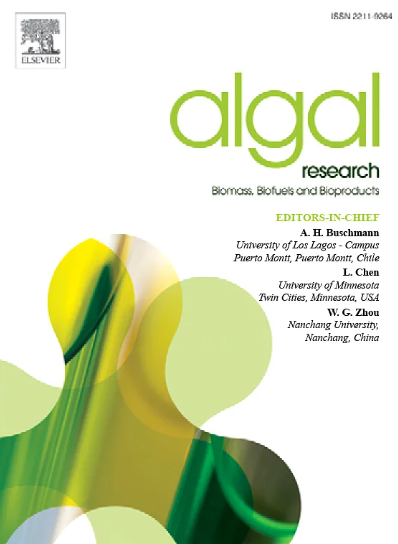生理学和转录组的综合分析为硅藻(Thalassiosira profunda)的短期和长期盐度适应提供了见解。
IF 4.5
2区 生物学
Q1 BIOTECHNOLOGY & APPLIED MICROBIOLOGY
Algal Research-Biomass Biofuels and Bioproducts
Pub Date : 2025-08-18
DOI:10.1016/j.algal.2025.104269
引用次数: 0
摘要
全球气候变化导致海洋和淡水环境盐度的变化,对硅藻的生存构成了严峻的挑战。阐明硅藻,特别是居住在河口地区的硅藻对盐度波动的生理反应和适应机制,对维持河口生态系统的初级生产力和保护沿海地区的生物多样性具有重要的生态意义。在这项研究中,我们通过分析生理变化和转录组学,研究了深海硅藻在两种盐度水平(30 PSU和15 PSU)下短期(7天)和长期(2年)对盐度的代谢适应。结果表明,在低盐度环境下,深叶霉对氧化损伤的响应主要表现为增加多糖、蛋白质的合成和增强抗氧化酶的活性。深叶霉上调光合作用以获得额外的氧化损伤修复能量。我们观察到,短期盐度变化导致细胞硝酸盐代谢、TCA循环和脂肪酸代谢的重编程。丝裂原激活的蛋白激酶信号通路的上调提高了细胞内过氧化氢酶活性水平,这可能是减轻长期低盐适应的光系统损伤的关键。本文章由计算机程序翻译,如有差异,请以英文原文为准。

The integrated analysis of physiology and transcriptomes provide insights into the short- and long-term salinity adaptation of the diatom (Thalassiosira profunda)
Global climate change has resulted in alterations in salinity in both marine and freshwater environments, posing severe challenges to the survival of diatoms. Elucidating the physiological responses and adaptive mechanisms of diatoms, particularly those inhabiting estuarine regions, to salinity fluctuations holds significant ecological implications for sustaining primary productivity in estuarine ecosystems and preserving biodiversity in coastal zones. In this study, we investigated the metabolic adaptation of Thalassiosira profunda to salinity over short term (7 days) and long term (2 years) periods at two salinity levels (30 PSU and 15 PSU) by analyzing physiological changes and transcriptomics. The results demonstrated that T. profunda responded to oxidative damage by increasing synthesis of polysaccharides, proteins and enhancing antioxidant enzyme activities when exposed to low salinity. T. profunda upregulated photosynthesis to obtain additional energy for oxidative damage repair. We observed that short-term salinity change resulted in a reprogramming of cellular nitrate metabolism, TCA cycle and fatty acid metabolism. The upregulation of mitogen-activated protein kinase signaling pathway enhanced intrinsic cellular catalase activity levels, which might be crucial for alleviating photosystem damage in long-term low salinity adaptation.
求助全文
通过发布文献求助,成功后即可免费获取论文全文。
去求助
来源期刊

Algal Research-Biomass Biofuels and Bioproducts
BIOTECHNOLOGY & APPLIED MICROBIOLOGY-
CiteScore
9.40
自引率
7.80%
发文量
332
期刊介绍:
Algal Research is an international phycology journal covering all areas of emerging technologies in algae biology, biomass production, cultivation, harvesting, extraction, bioproducts, biorefinery, engineering, and econometrics. Algae is defined to include cyanobacteria, microalgae, and protists and symbionts of interest in biotechnology. The journal publishes original research and reviews for the following scope: algal biology, including but not exclusive to: phylogeny, biodiversity, molecular traits, metabolic regulation, and genetic engineering, algal cultivation, e.g. phototrophic systems, heterotrophic systems, and mixotrophic systems, algal harvesting and extraction systems, biotechnology to convert algal biomass and components into biofuels and bioproducts, e.g., nutraceuticals, pharmaceuticals, animal feed, plastics, etc. algal products and their economic assessment
 求助内容:
求助内容: 应助结果提醒方式:
应助结果提醒方式:


